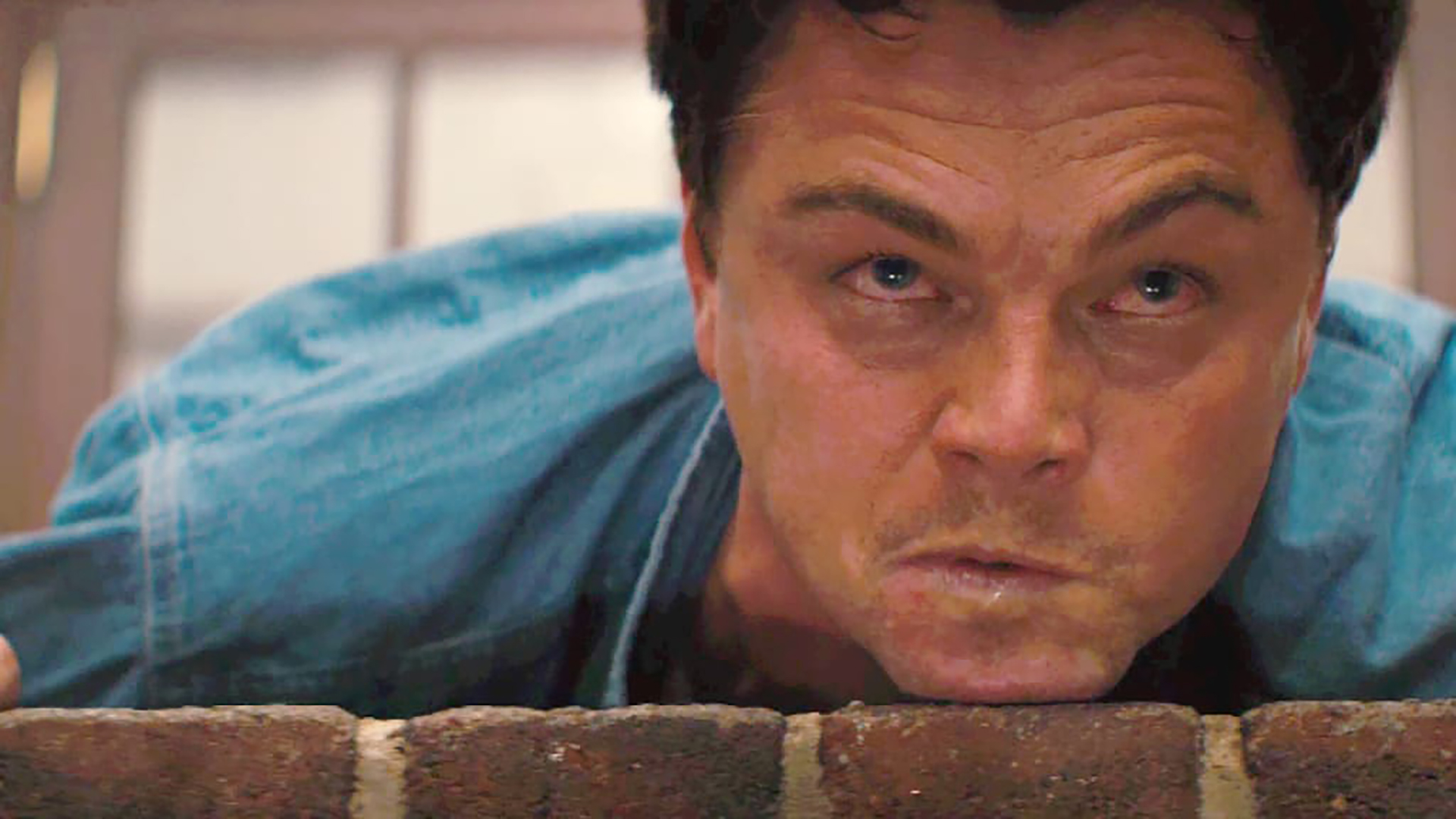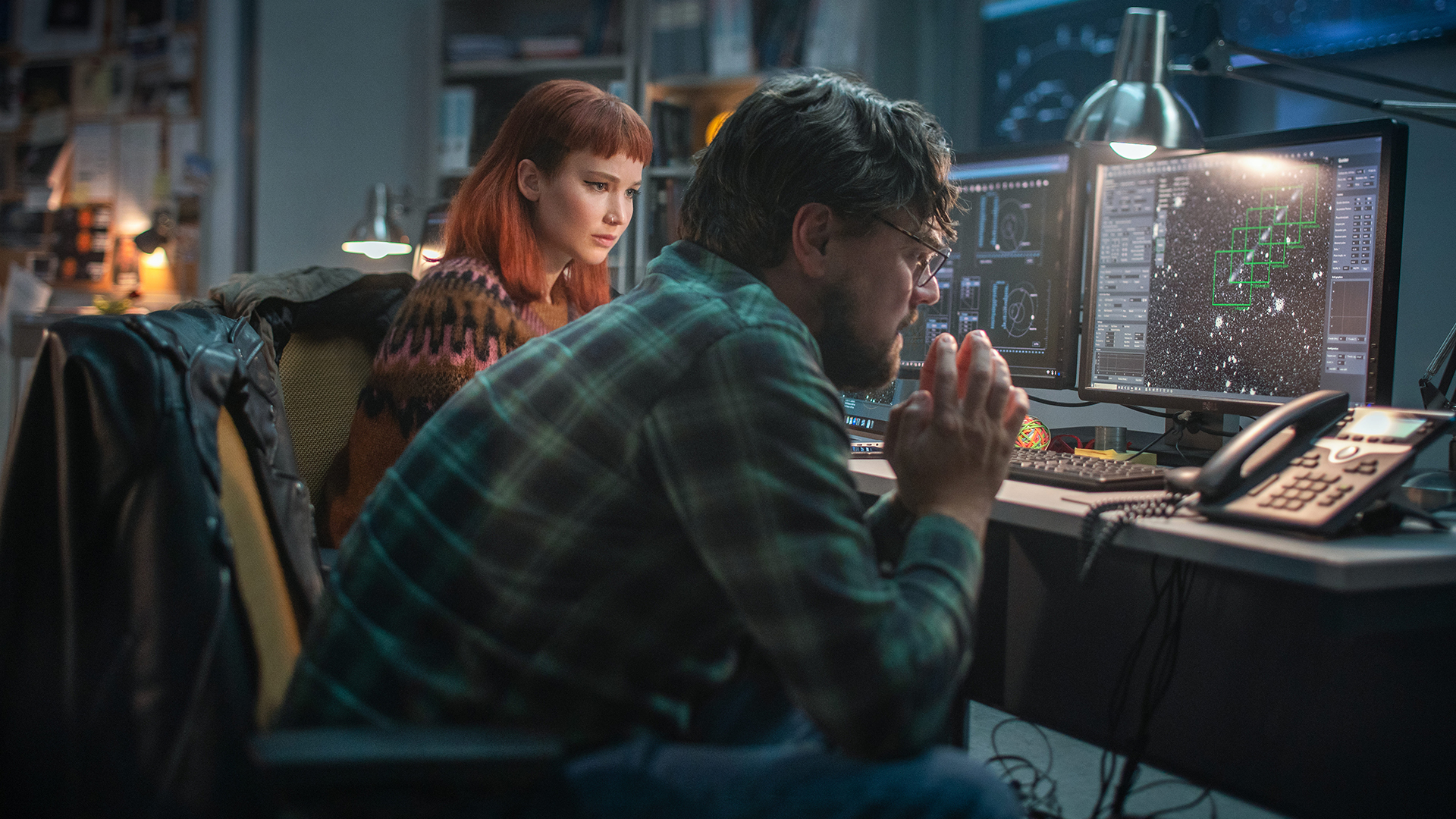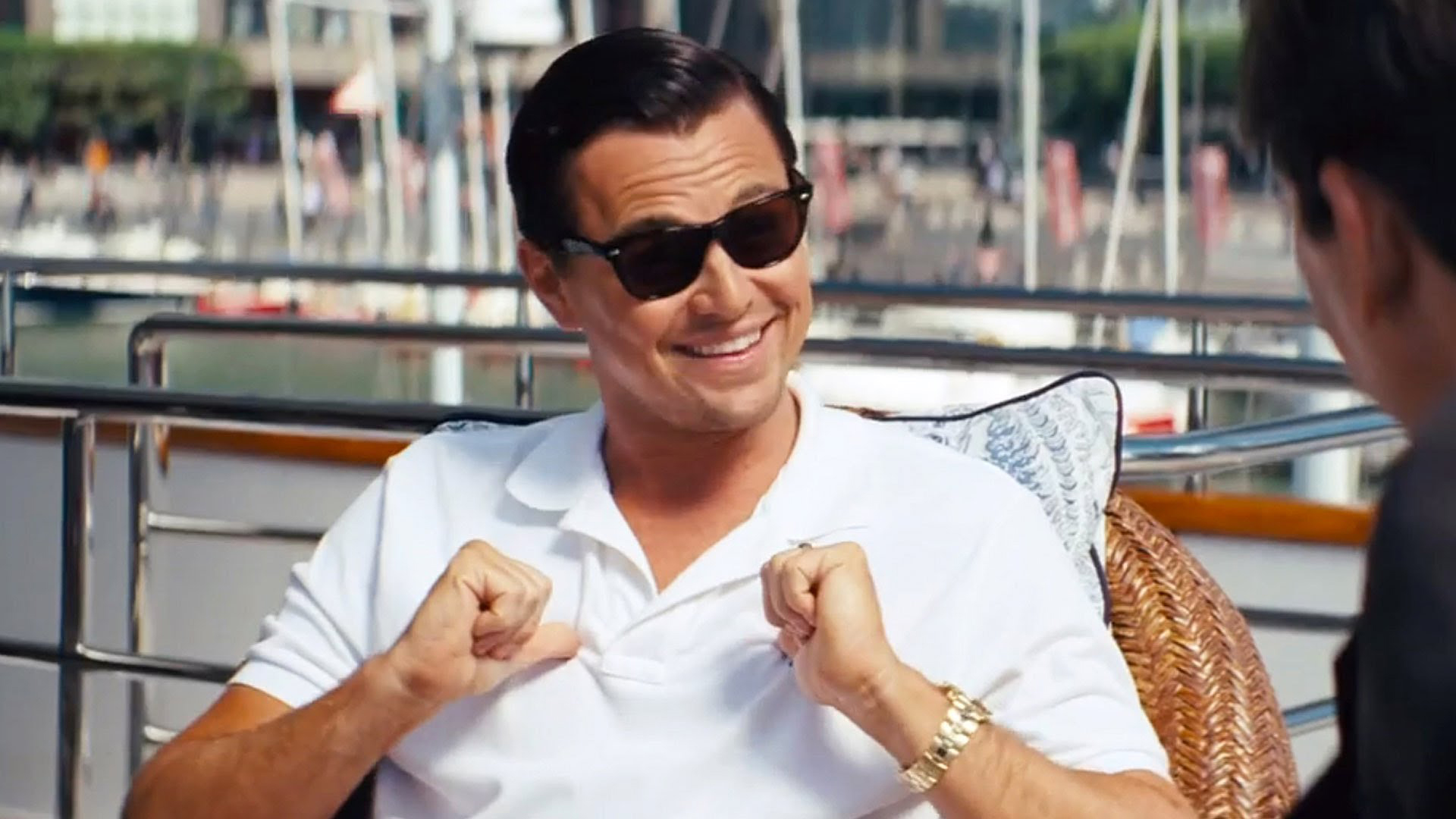As Leo top-lines the comic satire Don’t Look Up, our resident DiCaprio expert Yasmin Omar explores the movie star’s recent, surprisingly successful shift from drama to comedy.

‘I never would’ve guessed that I’d have won for Best Actor in a Comedy,’ said a bemused Leonardo DiCaprio when accepting his Golden Globe for The Wolf of Wall Street in 2014. ‘I’d like to pay some congratulations to my fellow comedians here tonight,’ he continued with a cheeky grin to knowing laughter from the star-studded crowd. In all fairness, it was unexpected that he would prevail in this category. Although renowned for his immense versatility, DiCaprio has mainly showcased his chameleonic talents in dramas, playing drug addicts (The Basketball Diaries, 1995) and dream addicts (Inception, 2010), kids living with autism (What’s Eating Gilbert Grape, 1993) and men living with mental illness (The Aviator, 2004; Shutter Island, 2010). There are, of course, glimmers of humour in his filmography: his plaintive delivery of the line ‘I’ll just wait here!’ as he stands, handcuffed to a pipe with water gushing around him in Titanic (1997) never fails to make me laugh, and his inelegant clattering around the Capulet courtyard in Romeo + Juliet (1996) is similarly amusing. Yet, overall, you’re much more likely to watch DiCaprio play a character in ‘a constant, 24-hour panic attack’, as he described his approach to portraying the anxiety-riddled undercover cop Billy Costigan in The Departed (2006), than you are to see him inject levity into his work.

Inception (2010)
With the exception of the vaguely comedic Catch Me If You Can (2002), DiCaprio didn’t align himself with the genre until signing onto the out-and-out comedies The Wolf of Wall Street (2013) and Once Upon a Time in Hollywood (2019), both of which partially derive their humour from the gap between how his characters present themselves and who they really are underneath. As the detestably charismatic stockbroker Jordan Belfort in The Wolf of Wall Street – Martin Scorsese’s orgiastic depiction of capitalist greed and criminal depravity – the actor constructs an image of easygoing, swaggering confidence, welcoming us into Jordan’s Long Island mansion with a bragging, direct-to-camera monologue and a literal wink to the audience about his excessive drug use. He gives the impression of being a master of the universe, but we soon discover that this is all based on hubris: his wife (Margot Robbie) hates him, his money was earned fraudulently and his assets are due to be seized by the federal government.
Thelma Schoonmaker’s editing comically punctures his bravado when Jordan peddles penny stocks in his first sales call at the Investis Center. DiCaprio talks a big game to his client, lacing his overblown pitch with lies about the company’s viability, and punctuating his claims with emphatic hand slaps, finger pointing and air punching. Then we cut to an image of the business in question: a ramshackle wooden shed clearly not responsible for the ‘cutting-edge technology’ he tells us about. The Wolf of Wall Street is a comedy of contrasts, building up its self-aggrandising protagonist only to reveal that his foundations aren’t as solid as he pretends. (Interestingly, Quentin Tarantino uses this same smash-cut technique to underline the mistruths DiCaprio’s fading actor Rick Dalton propagates in Once Upon a Time in Hollywood, even going so far as to have the voiceover scoff, ‘That’s a big f*cking lie.’)
What really delighted audiences about DiCaprio’s turbo-charged performance in Wolf, though, was his remarkable, and previously undemonstrated, facility for physical comedy. An early scene, shortly after he has founded his broking firm Stratton Oakmont, shows him training his staff in the art of the deal via a speakerphone client call, while simultaneously acting out an elaborate mime of taking said client from behind. The whole thing is pretty explicit – with sneering derision Jordan pretends to unbutton his fly, expose himself and spread the guy’s buttocks – and DiCaprio sells the lewd charade with fittingly smug arrogance. There are plenty of other chuckle-worthy gems of this nature, including a close-up on his limp feet collapsing onto a bed after premature ejaculation (‘I f*cked her goddam brains out… for 11 seconds’) and his crazed jumping to mimic Willy Wonka’s Oompa Loompas in the Stratton dealing room, but undoubtedly the pièce de résistance is the Lemmons sequence.

The Wolf of Wall Street (2013)
Hours after taking four expired quaaludes, Jordan is suddenly hit by their delayed potency and loses all motor skills at his local country club. This is far and away the most laugh-out-loud moment of Wolf thanks to DiCaprio’s open-armed embrace of its slapstick. He lurches around like a marionette, writhing on the ground and dragging his useless body across the tarmac, letting out whimpering moans and leaking trails of saliva. His speech is slurred, strained and lisping, as if the actor has taken a potato masher to his words and pulverised them into incomprehensible mush. The discrepancy between Jordan’s manipulative control when sober and complete helplessness when off his face on drugs only makes the indignity of his rolling down a flight of stairs more hilarious. It really is no wonder that The New Yorker’s Richard Brody named DiCaprio’s work in Wolf ‘the best movie performance of the century so far’ earlier this year, declaring that the actor ‘achieved his cinematic apotheosis’ with this role.
Beyond the part itself, DiCaprio brought its sense of playful self-deprecation to the Wolf press tour, which was surprising given that he has cultivated such a hyper-serious off-screen persona: scroll his social-media accounts and you’ll find his feeds dominated with environmental activism and the odd studio-mandated plug for his upcoming movies, or listen to the rare interviews he gives to hear thoughtful, measured observations on his projects. He seemed more loose on the Wolf promo campaign, particularly when he crashed his co-star Jonah Hill’s Saturday Night Live hosting gig, visibly holding back laughter during their skit before spoofing the Titanic flying scene, arms stretched out wide, face nuzzled into Hill’s neck.
In Once Upon a Time in Hollywood, Tarantino’s revisionist paean to 1960s showbiz, DiCaprio cements his physical-comedy credentials, really tapping into his down-and-out character’s feelings of worthlessness via histrionic outbursts. When shooing hippies off his driveway, he storms out of his home in a ridiculous-looking, above-the-knee robe, screams insults at them and noisily slurps frozen margarita straight from the blender. Tarantino captures this clownish spectacle in a wide shot, shrinking DiCaprio’s stature within the vastness of the frame to highlight just how pathetic Rick is. Much like Wolf, which begins with a prestigious, trustworthy advert for Stratton Oakmont before devolving into the obscene chaos of the coked-up sales floor, Hollywood peels back the layers separating Rick’s public and private images. The film opens on Bounty Law’s Jake Cahill, Dalton’s slick, self-assured onscreen cowboy, firing at bad guys and ably commanding our attention; the next scene removes one layer to show Dalton as a suave public figure conducting an interview with his stunt double (Brad Pitt), again smoothly confident; finally, we transition to him in real life, his core self, in a meeting with a big-shot agent (Al Pacino). In this last sequence, DiCaprio reveals who his character is behind closed doors: a sweaty-browed wreck, nervously tripping over his own words with a noticeable stutter clogging his Missouri drawl. His emotions are right on the surface: he wears his consternation at the demise of his flagging career like a physical weight on his sunken shoulders and sagging features. He’s pitiful – and it’s funny.
The same goes for Hollywood’s standout scene: Rick’s temper-tantrum meltdown in his trailer after flubbing his lines on set. The sequence did not appear in Tarantino’s script; it was entirely DiCaprio’s idea and he came up with all the dialogue, making him the first actor to ever be allowed to improvise a scene on a QT movie. DiCaprio dances on the knife edge of comedy and tragedy here, throwing his hipflask around and babbling like a baboon one minute, wiping away tears and planning his own suicide the next. Wisely, he brings his experience leading dramas to this breezy hangout movie; by treating the buffoonish Rick as seriously as he would any other character, he infuses him with an undercurrent of sadness, thereby heightening our response to his carefree moments. We laugh more heartily when he’s flat-out drunk singing tunelessly to the radio precisely because DiCaprio has laid the groundwork for us.
The actor continues his comic streak with Don’t Look Up (2021), an apocalyptic satire from Adam McKay – who, let’s not forget, directed the frat-bro classics Anchorman (2004) and Step Brothers (2007) before branching out into political dramedies. It’s brilliant casting to have DiCaprio in the role of Professor Randall Mindy, an astronomer trying to warn humanity of the species-killing comet rushing towards Earth, since he’s spent the past two decades shouting into the void about impending environmental disaster in real life. (By being involved, he’s essentially saying, ‘You didn’t watch my climate-change documentaries, so I’ll serve you the same message in a more palatable, feature-film format.’) DiCaprio plays the straight man in Don’t Look Up, largely ceding the floor to Jonah Hill’s entitled Chief of Staff and Meryl Streep’s self-involved right-wing President for the gags. The jokes he lands are at his character’s expense: he presents Randall as a bumbling, pop-culturally clueless Gen Xer, the kind of dork whose idea of pillow talk is waxing lyrical about getting his Star Wars poster signed by Mark Hamill. It’s another perfectly calibrated performance from DiCaprio, not least because you can witness him hurtling through the five stages of grief – from twitching, nervous shock to screaming, red-faced rage and beyond – before your very eyes over the course of the movie. In addition to anchoring Don’t Look Up in real, human emotion, DiCaprio is also responsible for ‘the biggest laugh in the movie’ according to McKay, with a scene that (like the Hollywood trailer meltdown) was improvised. Even when playing a guy in an acute state of existential panic, the newly comic DiCaprio can still be counted on to mine darkness for comedy.

Don't Look Up (2021)
Maybe we shouldn’t have been surprised in 2013 when DiCaprio portrayed a laughable, out-of-control banker in Scorsese’s rollicking The Wolf of Wall Street. As an actor, he’s always stretching himself creatively and taking on unlikely parts. Back in 2006, people were sceptical about his casting in The Departed, struggling to imagine him as a Boston tough guy, but he really holds his own against Jack Nicholson’s menacing mob boss. It’s DiCaprio’s very willingness to subvert expectations that makes him one of our most compelling movie stars. He’s back on home turf for his next couple of projects – the Scorsese collaborations Killers of the Flower Moon (2022) and Roosevelt (2023) – both dramas that promise weighty roles for their lead. Throughout his varied career, Leonardo DiCaprio has definitively proved that, regardless of genre, he always rises to the occasion.

